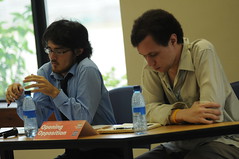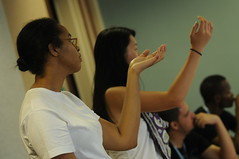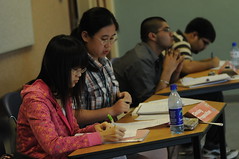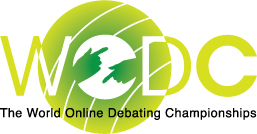45 days to go! - November 1 Featured in this issue :
- 15 more days to submit your essay for the IDEA Global Challenge!

- Stories and updates from the TGD contest
- News and The Global Debates International Migration Portal!
- Feature of the week – Organize your public debate!
- Our partners help us spread the word!
- Frequently asked questions
15 days to submit your essay for the IDEA Global Challenge! Great rewards for joining in!
Don't forget to submit an essay summarizing the best arguments and evidence you gathered for your public debate on the topic of: Nations of the world should increase protection of the economic and social rights of migrants.
Your essay should present your team’s best arguments for the proposition, the team arguing in favor of the resolution. Aim for 3-5 double-spaced pages. And don't forget to send it to us by November 15!
And what can you win?
- The prize winning essays will be featured in the next issue of Idebate Magazine and posted on idebate.org and The Global Debates website
- The top 10 entries will earn 500 bonus points for the Global Debates
- the top two Global Debate Challenge Fall 2010 Campaign entries will win 50% fee waiver for the 2011 IDEA Youth Forum, which takes place from July 19-August 1, 2011 in Istanbul, Turkey.
Submit your best work and aim for the top prizes!
Stories and updates from the TGD contest
Rebecca Kuhn and her team from Bugil Academy (Korea) played the PlayDecide migration game. Along with her friends, they agreed on adopting the policy nr 3, with the following addendum: Nations must accept immigrants with refugee status defined by the UN. Furthermore individual nations could additionally decide further acceptance of immigrants undefined by the UN such as climate refugees.
Kristen Dupard from Ridgeland High School (USA) submitted her Research Blog on how are Ugandan internally displaced persons recovering from the aftermath of the war between the Ugandan government and the Lord’s Resistance Army (LRA).
“There is a huge number of migrants in the world, in the United States alone there are 33.1 million immigrants, legal and illegal, that seek the “American Dream.” This is the opening sentence of Migrant Action plan submitted by the students from The Grover Cleveland High School (USA). They are in the game for the above mentioned prizes. Are you?
Interesting News and The Global Debates International Migration Portal!
Youth Producing change – film festival organized by the Human Rights Watch brings to life human rights abuses through storytelling in a way that challenges each individual to empathize and demand justice for all people. The festival also issued a call for submission of a Youth Film, so why not make a film and enter both TGD and the Human rights watch competition!
Selected article from our portal:
"A third factor that increases migration’s impact is its feminization: Nearly half of the world’s migrants are now women, and many have left children behind. Their emergence as breadwinners is altering family dynamics across the developing world. Migration empowers some, but imperils others, with sex trafficking now a global concern." Jason Deparle. "Global Migration: A World Ever More on the Move." New York Times. June 26th, 2010
Feature of the week – Organize your public debate!
here are some tips:
1. Choose the audience wisely - it might seem easiest to invite your fellow students, but if the issue is migration you might consider thinking bigger. If you bring together mixed groups it is more likely that media, and public officials will want to attend your event.
2. Choose a good date - think about the most suitable date, when most of your audience will be available. Sundays and holidays might not be the best dates, although it depends on whom would you like to invite!
3. Choose and reserve a venue - it can be school, church , library, public cafe. You should think about where your target group is most likely to come and feel confident to participate. Also think about the size of the space. Make sure the selected venue is available before you send out invitations!
4. Assign the speakers and moderator - be careful to chose your most prepared speakers and confident moderator that will be able to handle the debate and public discussion well.
5. Invite local government officials & other community members
6. Send out press releases to earn media coverage
7. Send out invitations to your event and follow up with them.
8. Make sure your debaters are well prepared by holding a prep-debate at least a few days before the event starts
9. Make sure your venue, speakers and moderator are ready in time
10.Document your public debate - don't forget to circulate a sign-up sheet (required), capture a video footage (optional) and take photographs (required). If you have media present don't forget to follow up with them, so that they mention your name, the name of the school, the name of the event or the name of the project (Te Global Debates).
To get you started with the content please refer to The Global Debates International Migration Portal and our introductory article into the topic, as well as the guide to the Public debate.
Our partners help us spread the word! Help us too and become a partner!
The Global debates and our partners are helping us spread the news about TGD.
OneWorld - Netherlands
Daily monitor – Uganda
Polis e-newsletter 25 (Oktober _ November 2010)
Ecsite - Belgium
Global Changemakers – Switzerland
Yactivist - Thailand
FAQ:
Q. Does the Parent Teacher Student Association (elected) president (leader) count as points? Thank you!
A. Unfortunately no. This is the section of the guide on eligible elected officials:
An elected leader is someone who is chosen by the public community for a position within a local or national government body.
Q. Do we have to organize more than one public debate?
A. No, you are required to organize only one public debate. However in order to collect more points, you are encouraged to organize more of them.
Do you have more questions or remarks? Let us know!
The Global Debates Team
 WUDC Round9 motion: TH believes that social movements should use the courts rather than the legislature to advance social change
WUDC Round9 motion: TH believes that social movements should use the courts rather than the legislature to advance social change

























